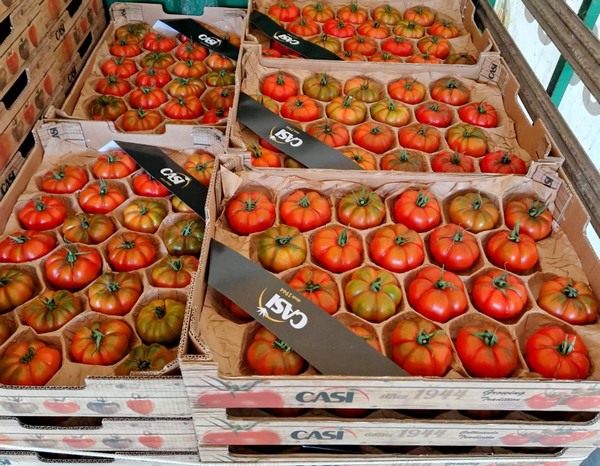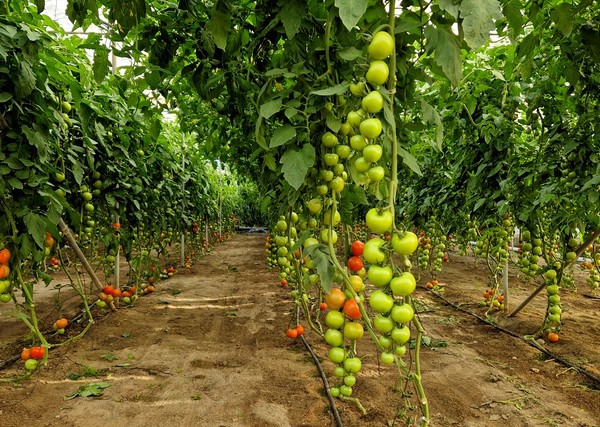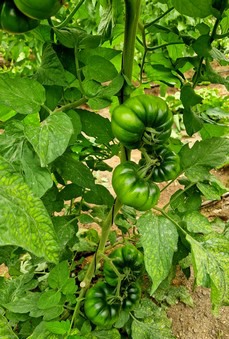The largest tomato producing and marketing cooperative in Europe, CASI, can trace its origins back to 1944, when a group of growers from the Vega de Almeria joined forces to market their potato productions. That association grew with new vegetable producers who had bet on tomato cultivation and the use of greenhouses, as both intensive agriculture under plastic and the crop's cultivation spread in the province. Today, it is the leading cooperative in its segment.
"Today CASI is made up of almost 1,400 members; small growers with an average area of 1.5 hectares," said Antonio Bretones, president of CASI, as we toured the facilities of CASI Aeropuerto, which were put into operation in 2014 and are devoted to handling produce for export. They are equipped with the latest technology and automation for the handling of the 240 million kilos of tomatoes that they market annually.
"The auction has been at the core of our activity from the beginning and accounts for 50% of it, while the other 50% corresponds to direct marketing," said Antonio. "We also have an online service for direct sales to the end customer which is receiving more and more orders."
"We also have La Plaza, which is a sales point for traders and stores in the county, and we want to expand it at our Partidores center as a store open to the general public and to our workers and partners, who also have our supply section and our team of technicians at their disposal. CASI is more than a cooperative, it is a big family," he said.
Gonçalo Andrade, from Portugal Fresh, and Wolfgang Braunstein, from gfa-consulting, together with CASI members Julián Rodríguez, Esther Oliva, Antonio Bretones and Celedonio Pleguezuelos, at the recent ICOP 2023.
"The campaign is about 15-20 days behind last year's"
"This 2023/24 campaign has started with a bit of a delay compared to other years," said Antonio. "The planting was carried out later due to the heat, and there seem to have been delays of a few days with the seedbeds, so the campaign is about 15-20 days behind last year's. So far, given the lower production, prices have generally been good, but as the volumes increase, prices are dropping. In the case of cucumbers, the price has fallen by up to one Euro per kilo. However, we are hoping for the year not to be too bad in terms of prices, as costs are not going down."

CASI, a tomato specialist, works with several dozen varieties, many of which are proprietary ones awarded for their flavor by the prestigious Flavor of the Year competition, such as the Adora or the Rebel. "Our goal is to produce tomatoes with a good taste, as that is how we want to differentiate ourselves from other commodity tomato producers. Among all our varieties, one that stands out is the Corazón Invertido (Inverted Heart), a great tasting tomato that also offers great consistency and can be shipped with ease. Also worthy of note are the Adora or the Rebel, which last year won the Flavor of the Year award. We have started this year with our new black tomato variety Barbaro."
"In fact, we currently have an experimental farm where we are testing about 60 varieties to ensure we always produce and market the best tomatoes."

Sustainability is another key feature of CASI's tomato production, as well as quality and taste. "We are working on the implementation of digitalization in the farms of our partners to make even better use of the water resources. It is worth recalling that in Almeria we have lacked water for 60 years; for us, it is not a new issue. All agriculture in Almeria started with the same lack of water that we have today, and it is an issue that we really know how to address."
"People always talk about there being a sea of plastic, but if we lifted the plastic covers of the greenhouses, we would see 33,000 hectares of orchards in the middle of the desert," said Antonio.


“In addition to our centers in Partidores and Aeropuerto, we also have one in San Isidro devoted exclusively to organic products, which continue gaining ground every year,” said Antonio Bretones. “Consumption, on the other hand, has been a little stagnant for the past two years due to inflation and the price gap between organic and conventional products. We have noticed that it is more difficult to ship organic tomatoes in November and December.
stagnant for the past two years due to inflation and the price gap between organic and conventional products. We have noticed that it is more difficult to ship organic tomatoes in November and December.
"It is a niche market with added value, but with clear limitations in terms of volume. The European Commission wants 25% of agricultural land to be organic by 2030. That's a very ambitious goal, and looking at the current market trends, it seems difficult to achieve. In my opinion, zero waste production is the way to go, and in Almeria, in general, we have already achieved it," said Antonio.
 For more information:
For more information:
CASI
Carretera Níjar, la Cañada, km 8
04130 El Alquián, Almería, Spain
Tel.: +34 950 626 141
[email protected]
www.casi.es










